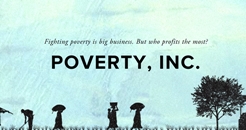 Global poverty 2 - Poverty Inc.
Global poverty 2 - Poverty Inc.
When a film wins 30 worldwide Film Festival honours and 11+ awards and it's about poverty, we should sit up and take notice.
Such a film is Poverty Inc. It's a 94 minute film drawn from over 200 interviews filmed in 20 countries.
It unearths an uncomfortable side of charity we can no longer ignore. From TOMs Shoes to international adoptions, from solar panels to U.S. agricultural subsidies, the film challenges each of us to ask the tough question: Could I be part of the problem?
"I see multiple colonial governors," says Ghanaian software entrepreneur Herman Chinery-Hesse of the international development establishment in Africa. “We are held captive by the donor community.”
The West has positioned itself as the protagonist of development, giving rise to a vast multi-billion dollar poverty industry - the business of doing good has never been better.
Here are some quotes about the film:
"Having grown up in a poor village in Kenya, I cannot stress enough the importance of this film.” Dr. MD Kinoti, Professor of Non-Profit Management [Kenya]
"A powerful and uncompromising film that strikes at the core of the traditional understanding of development and international assistance.” Andres Jimenez, Waging Non-Violence [Costa Rica]
Here is a 2 minute trailer:
The film website is here and the film is available for a small fee for viewing on Amazon, Netflix, Vimeo, Google Play, iTunes, etc. Why don't you organise a viewing?
If you are a charity trustee or an individual donor, it does raise the question of priorities for giving to overseas development (apart from disaster relief). For me personally it highlights the importance of education and economic development. These are two of the Sustainable Development Goals (SDGs).
What organisations in-country could be examples of combining both of these focii?
Firstly, Sinapis (latin for mustard seed). They are based in Kenya and they train entrepreneurs giving them biblically based business training whilst helping to develop their businesses. They are now scaling to Ghana.
Secondly, Living Goods. They support networks of ‘Avon-like’ community health entrepreneurs who go door to door to teach families how to improve their health and, to support themselves, they sell life-changing products such as simple treatments for malaria and diarrhea, safe delivery kits, fortified foods, clean cook stoves, water filters, and solar lights. By combining the best practices from business and public health, they are dramatically lowering child mortality (27% decrease) and creating livelihoods for thousands of enterprising women. They started in Uganda and are now scaling to Kenya.
Other organisations are obviously available!
Retweet about this article:
Geoff Knott, 27/06/2017